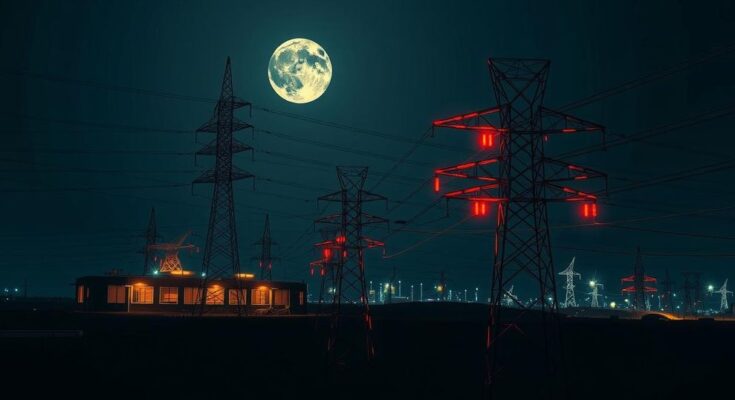A recent storm in São Paulo left 3 million without power for days, igniting urgent discussions on regulatory changes to improve the resilience of the electricity distribution network. With extreme weather events becoming more frequent, regulatory bodies and energy companies are striving to adapt their strategies for a changing climate, highlighting the need for significant investment and infrastructure improvement.
The recent storm that battered São Paulo, resulting in the loss of electricity for approximately 3 million consumers over several days, has underscored the urgent need for regulatory reforms aimed at enhancing the resilience of the power distribution network amid extreme climatic events. This discourse has surfaced prominently following two severe storms in less than a year, exacerbating public scrutiny on Enel São Paulo, which provides services to 24 municipalities, including the capital. In November 2023, the combination of heavy rains and wind gusts caused significant damage, with around 1,300 trees impacting the power grid. A similar pattern unfolded last week, where wind speeds reached approximately 107 kilometers per hour, resulting in extensive disruptions throughout the electric grid and prompting widespread evaluation of the responsibilities of relevant parties, including Enel São Paulo and local government agencies. The frequency of such extreme weather events is notably increasing. For instance, Rio Grande do Sul experienced one of its worst storms in April, while cities such as Ubatuba and São Sebastião, along with areas in Recife, suffered similar fates due to severe storms in 2023, tragically resulting in fatalities. In the context of these climatic challenges, Brazil is also grappling with its most severe drought in history. Regina Célia dos Santos Alvalá, director of the National Center for Monitoring and Early Warning of Natural Disasters (CEMADEN), emphasized the necessity for various sectors, particularly electricity, to adapt to this new climatic reality, stating, “Today’s climate is not the same as the climate of the past.” This conversation regarding necessary reforms is pressing as distribution companies are responsible for planning and executing investments regulated by energy tariffs set by the Brazilian Electricity Regulatory Agency (ANEEL). It has been noted that investments deemed “imprudent” do not alter tariff structures, leading distribution entities to seek regulatory support to fund essential enhancements. The topic of grid resilience is now a focal point on ANEEL’s agenda. Recently, the agency initiated a public consultation to consider regulatory frameworks for the renewal of concessions for 20 distribution companies, which will commence upon expiration in 2025. This proposal aims to incentivize firms to commit to quality and continuity in energy supply and pursue the development of more robust grid systems. With this in mind, Bruna de Barros Correia, an energy attorney at BMA Advogados, asserted that the sector’s focus has shifted from merely reducing greenhouse gas emissions to actively adapting the electric system for extreme weather events like severe droughts and storms. She raised important considerations about “incentive regulation” and the current mechanisms used by ANEEL to evaluate supply quality, which presently do not account for interruptions related to critical climatic incidents such as those witnessed recently. A thorough review of these rules could potentially impose obligations on distributors to compensate consumers financially during such emergencies. Further, Enel São Paulo’s CEO, Guilherme Lencastre, remarked on the necessity of updating concession contracts to secure preventive investments for future climate-related events. He acknowledged that the recent weather was unprecedented, stating, “It was the largest wind gust event ever reported in São Paulo’s history. We did not have forecasts for winds of the intensity that happened on Friday.” The company indicated their intention to invest R$6.2 billion from 2024 to 2026, thereby increasing their annual investment average. The Brazilian Association of Electric Energy Distributors (ABRADEE) projected that about R$130 billion will be earmarked for distribution improvements until 2027, with 37% allocated specifically for structural enhancements. According to Ricardo Brandão, ABRADEE’s executive director of regulation, establishing strict timelines for energy restoration is inherently complex. Technicians are often faced with the challenge of reconstructing damaged networks, a task that cannot be resolved swiftly. A portion of upcoming investments will target innovative technologies, such as “self-healing” systems that autonomously reconnect grids following minor outages, thereby allowing resource optimization for major reconstruction efforts. Brandão emphasized that considerations for extreme weather are already integral to modernization plans, asserting that this issue remains a high priority within the distribution sector.
The severe storms in São Paulo have highlighted the vulnerabilities of the electric distribution system amidst increasing incidents of extreme climatic events in Brazil. With significant damage caused by storms, discussions on regulatory reforms aimed at enhancing the resilience of power infrastructure have intensified among stakeholders in the electricity sector. The impact of climate change, frequent droughts, and storms necessitate comprehensive strategies to adapt and improve the existing grid systems to sustain service continuity and quality in the wake of such challenges.
The recent blackout in São Paulo and the subsequent discussions surrounding regulatory reforms underscore the urgent need for enhanced resilience in the electric power distribution network in Brazil. With the increasing frequency of extreme weather events, the electric sector must adapt to ensure sustainable service delivery. Investments in infrastructure and new regulatory measures are essential to prepare for future climatic adversities, ensuring reliability and safety for consumers.
Original Source: valorinternational.globo.com




